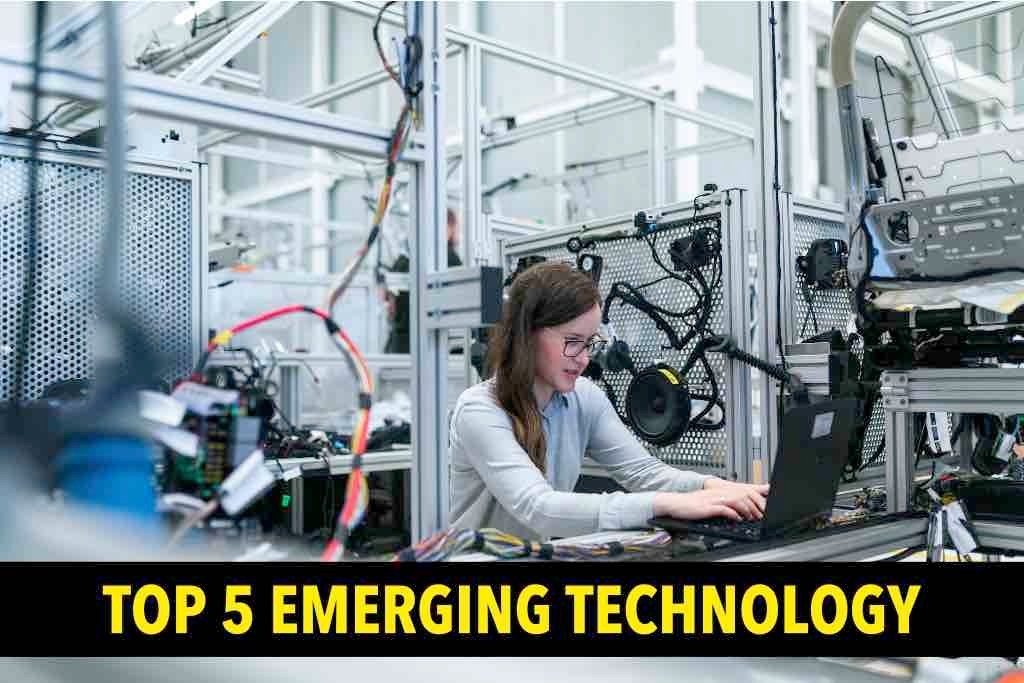Technology is continuously advancing, and it might be hard to remain mindful of the latest trends.
Top 5 Emerging Technology Trends to Watch Out
As we enter an additional 10 years, it’s important to think about the headway made in the previous decade and anticipate the innovations that will shape the following decade. Here are the top 5 emerging technology trends to watch out for:
1. Artificial intelligence (man-made intelligence)
Computer-based intelligence has made considerable progress lately, and it’s essentially going to end up being more pervasive and complex in the years to come. Organisations are currently involving artificial intelligence in undertakings like customer administration, advertising, and even product improvement. As computer-based intelligence gets better at understanding and answering human requirements, it will turn out to be a considerably more significant instrument for organisations.
2. The Internet of Things (IoT)
The internet of things (IoT) implies the association of real gadgets, vehicles, home machines, and different things that are related to the internet. IoT gadgets can talk with one another and share information, which helps organisations and shoppers automate assignments and seek better decisions.
3. Extended reality (AR)
AR technology superimposes PC-produced pictures on this current reality, and it has a wide range of potential applications. For instance, AR can be used for gaming, retail, instruction, and, surprisingly, medical administrations. As AR technology ends up being more widespread, it will fundamentally adjust how we speak with our overall surroundings.
4. 5G
5G is the up-and-coming time of compact association technology, and it will be a tonne faster and more reliable than 4G. 5G will empower new and inventive applications like AR and VR, as well as additional traditional applications like electronic video and gaming. 5G will also colossally influence the IoT, as it will provide the quick, low-inertness network that is fundamental for billions of gadgets to talk with one another.
5. Quantum processing
Quantum processing is one more kind of calculation that uses quantum-mechanical eccentricities to perform calculations. Quantum laptops are a tonne faster and more surprising than standard computers, and they might conceivably handle tasks that are obstinate for traditional computers. Quantum registration is still in its beginning stages, yet it is rapidly advancing, and it is typical for it to have a significant impact in the years to come.
Artificial Intelligence
Artificial intelligence is one of the most captivating and rapidly developing emerging innovations today. The following are five inspirations driving why you should zero in on computer-based intelligence:
1. Artificial intelligence is, right now, not just a science fiction thought.
At this point, we’re beginning to see reenacted intelligence enter the norm as virtual partners like Siri and Alexa emerge, and more organisations are starting to use computer-based intelligence to automate undertakings and seek better decisions.
2. Artificial intelligence might perhaps change numerous businesses.
Artificial intelligence is being used or shows promise in different businesses, from medical administrations to assembly.
3. Artificial intelligence can help us tackle some of the world’s most pressing issues.
Mimicked intelligence might perhaps help us tend to worldwide hardships like environmental change, food and water shortages, and infection.
4. Artificial intelligence is opening new entryways for organisations and shoppers.
As artificial intelligence gets more splendid, organisations are tracking down better ways to use it to work on their things and administrations, and buyers are profiting from things like more redone administration and better ideas.
5. Artificial intelligence is significantly altering how we live and work.
Computer-based intelligence is beginning to genuinely influence our lives, from how we search for data to how we speak with our gadgets.
Enormous Information
The maxim “gigantic information” has become progressively typical lately as organisations desire to harness the power of tremendous informational indexes to secure experiences for their customers, undertakings, and assets. In any case, what unequivocally is huge information, and what are its ideas for organisations?
Generally speaking, colossal information insinuates informational assortments that are excessively tremendous or complex to be handled utilising standard techniques. Huge informational assortments much of the time come from sources like online entertainment, sensors, and site logs and can contain different types of information, including text, pictures, and recordings, and that is just a glimpse of something larger.
Handling and examining a lot of information can be a test, yet it can also equip organisations with a wealth of pieces of knowledge about their customers, things, and undertakings. For instance, by examining online entertainment information, organisations can find out about customer sentiment, distinguish ongoing fads, and track the progress of advertising endeavours.
Additionally, a lot of information might conceivably help organisations streamline their undertakings by recognising disappointments and districts for development. For instance, by investigating information from sensors, organisations can perceive issues with their assembling interactions and make changes to work on quality control.
The consequences of a lot of information are broad, and organisations are still in the beginning stages of investigating every one of the ways in which working on their undertakings and better serving their customers can be used. As organisations proceed to accumulate and examine more information, the normal purposes for this tremendous measure of information will simply continue to exist.
Blockchain
Cryptocurrencies and blockchain technology are two of the most sizzling topics in the present monetary reality. Cryptocurrencies are advanced or virtual tokens that use cryptography to get their trades and to control the production of new units. Blockchain is the fundamental technology that powers cryptocurrencies like Bitcoin and Ethereum.
Blockchain is a passed-on information base that keeps a protected, computerised record of all cryptocurrency trades. Every trade is checked and kept on the blockchain, which forestalls twofold spending and blackmail. The decentralised nature of blockchain makes it impenetrable to hacking and change.
Cryptocurrencies have been gaining in predominance as an endeavour vehicle lately. A steadily increasing number of individuals are purchasing cryptocurrencies like Bitcoin and Ethereum as a method for supporting extensions and expanding their portfolio.
The prices of cryptocurrencies have been shaky lately. Notwithstanding, numerous experts acknowledge that the somewhat long opportunities for cryptocurrencies are positive. They feature the rising acknowledgment of cryptocurrencies by standard monetary organisations as an indication of the developing realness of this new asset class.
Blockchain technology is still in its early stages of improvement. Notwithstanding, it might conceivably upset the monetary framework. Blockchain could make it possible to create a worldwide, decentralised stage for secure, consistent, and quick trades.
If you are searching for an emerging technology example to watch out for, blockchain is a good choice.
Conveyed computing
For quite a while, organisations have been battling to remain mindful of the constantly changing landscape of technology. With new progressions being made consistently, it will in general be hard to tell which trends merit putting assets into and which will flame out. In any case, there are a couple of emerging technology trends that are ready to have a significant impact in a little while. The following are five to watch out for:
1. Appropriated computing
Maybe the greatest example in the tech world is appropriated computing. This is the ability to store and access information and applications over the Internet instead of on a genuine PC. This enjoys different benefits for organisations, including additional adaptability, flexibility, and cost-hold reserves.
2. Artificial Intelligence
Another region that is seeing a lot of development is artificial intelligence. This technology can recreate human intelligence and be used for undertakings like information investigations and courses. Man-made intelligence might perhaps change different endeavours, including medical administration, money, and getting together.
3. Augmented reality
Augmented reality is another technology that is beginning to gain some momentum. This is a PC-produced environment that can be used to submerge clients in a substitute world. VR has different potential applications, including schooling, arrangement, and amusement.
4. Extended Reality
Extended truth resembles augmented reality, yet it adds computerised components to this current reality rather than establishing an absolutely artificial environment. This technology has different anticipated uses, including thing discernment, gaming, and routing.
5. Blockchain
Blockchain is a scattered data set that considers secure, clear, and fixed trades. This technology is generally famous for its job in driving cryptocurrencies like Bitcoin; however, it has different potential purposes beyond that. Blockchain could be used for things like inventory networking on the board, character checks, and chief agreements.










